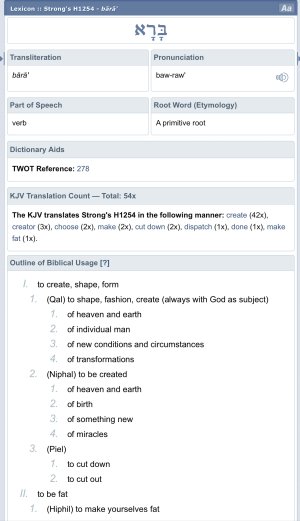You are missing the Point of Truth made by Elohim
So God
אֱלֹהִ֤ים ׀ (
’ĕ·lō·hîm)
Noun - masculine plural
Strong's Hebrew 430: 1) (plural) 1a) rulers, judges 1b) divine ones 1c) angels 1d) gods 2) (plural intensive-singular meaning) 2a) god, goddess 2b) godlike one 2c) works or special possessions of God 2d) the (true) God 2e) God
created
וַיִּבְרָ֨א (
way·yiḇ·rā)
Conjunctive waw | Verb - Qal - Consecutive imperfect - third person masculine singular
Strong's Hebrew 1254: 1) to create, shape, form 1a) (Qal) to shape, fashion, create (always with God as subject) 1a1) of heaven and earth 1a2) of individual man 1a3) of new conditions and circumstances 1a4) of transformations 1b) (Niphal) to be created 1b1) of heaven and earth 1b2) of birth 1b3) of something new 1b4) of miracles 1c) (Piel) 1c1) to cut down 1c2) to cut out 2) to be fat 2a) (Hiphil) to make yourselves fat
man
הָֽאָדָם֙ (
hā·’ā·ḏām)
Article | Noun - masculine singular
Strong's Hebrew 120: 1) man, mankind 1a) man, human being 1b) man, mankind (much more frequently intended sense in OT) 1c) Adam, first man 1d) city in Jordan valley
in His [own] image;
בְּצַלְמ֔וֹ (
bə·ṣal·mōw)
Preposition-b | Noun - masculine singular construct | third person masculine singular
Strong's Hebrew 6754: 1) image 1a) images (of tumours, mice, heathen gods) 1b) image, likeness (of resemblance) 1c) mere, empty, image, semblance (fig.)
in the image
בְּצֶ֥לֶם (
bə·ṣe·lem)
Preposition-b | Noun - masculine singular construct
Strong's Hebrew 6754: 1) image 1a) images (of tumours, mice, heathen gods) 1b) image, likeness (of resemblance) 1c) mere, empty, image, semblance (fig.)
of God
אֱלֹהִ֖ים (
’ĕ·lō·hîm)
Noun - masculine plural
Strong's Hebrew 430: 1) (plural) 1a) rulers, judges 1b) divine ones 1c) angels 1d) gods 2) (plural intensive-singular meaning) 2a) god, goddess 2b) godlike one 2c) works or special possessions of God 2d) the (true) God 2e) God
He created
בָּרָ֣א (
bā·rā)
Verb - Qal - Perfect - third person masculine singular
Strong's Hebrew 1254: 1) to create, shape, form 1a) (Qal) to shape, fashion, create (always with God as subject) 1a1) of heaven and earth 1a2) of individual man 1a3) of new conditions and circumstances 1a4) of transformations 1b) (Niphal) to be created 1b1) of heaven and earth 1b2) of birth 1b3) of something new 1b4) of miracles 1c) (Piel) 1c1) to cut down 1c2) to cut out 2) to be fat 2a) (Hiphil) to make yourselves fat
him;
אֹת֑וֹ (
’ō·ṯōw)
Direct object marker | third person masculine singular
Strong's Hebrew 853: 1) sign of the definite direct object, not translated in English but generally preceding and indicating the accusative
male
זָכָ֥ר (
zā·ḵār)
Noun - masculine singular
Strong's Hebrew 2145: n m 1) male (of humans and animals) adj 2) male (of humans)
and female
וּנְקֵבָ֖ה (
ū·nə·qê·ḇāh)
Conjunctive waw | Noun - feminine singular
Strong's Hebrew 5347: 1) female 1a) woman, female child 1b) female animal
He created
בָּרָ֥א (
bā·rā)
Verb - Qal - Perfect - third person masculine singular
Strong's Hebrew 1254: 1) to create, shape, form 1a) (Qal) to shape, fashion, create (always with God as subject) 1a1) of heaven and earth 1a2) of individual man 1a3) of new conditions and circumstances 1a4) of transformations 1b) (Niphal) to be created 1b1) of heaven and earth 1b2) of birth 1b3) of something new 1b4) of miracles 1c) (Piel) 1c1) to cut down 1c2) to cut out 2) to be fat 2a) (Hiphil) to make yourselves fat
them.
אֹתָֽם׃ (
’ō·ṯām)
Direct object marker | third person masculine plural
Strong's Hebrew 853: 1) sign of the definite direct object, not translated in English but generally preceding and indicating the accusative


